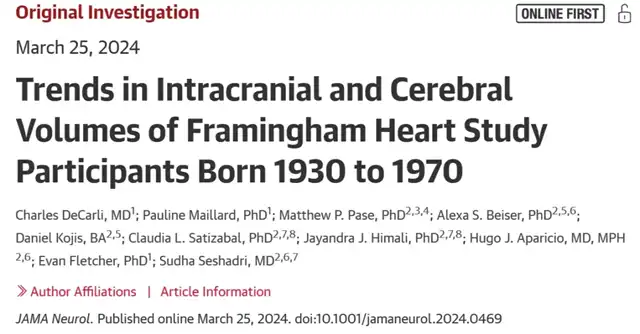Human Brain Continues to Grow: Study Shows Increase in Size and Complexity
- Normal Liver Cells Found to Promote Cancer Metastasis to the Liver
- Nearly 80% Complete Remission: Breakthrough in ADC Anti-Tumor Treatment
- Vaccination Against Common Diseases May Prevent Dementia!
- New Alzheimer’s Disease (AD) Diagnosis and Staging Criteria
- Breakthrough in Alzheimer’s Disease: New Nasal Spray Halts Cognitive Decline by Targeting Toxic Protein
- Can the Tap Water at the Paris Olympics be Drunk Directly?
Human Brain Continues to Grow: Study Shows Increase in Size and Complexity
- Should China be held legally responsible for the US’s $18 trillion COVID losses?
- CT Radiation Exposure Linked to Blood Cancer in Children and Adolescents
- FDA has mandated a top-level black box warning for all marketed CAR-T therapies
- Can people with high blood pressure eat peanuts?
- What is the difference between dopamine and dobutamine?
- How long can the patient live after heart stent surgery?
Human Brain Continues to Grow: Study Shows Increase in Size and Complexity
The human brain is still getting bigger! A 75-year follow-up study has found that the brain volume of people born in the 1970s has increased by nearly 7% compared to those born in the 1930s, and the surface area of the brain cortex has increased by nearly 15%.
Humans stand at the top of the food chain, relying not on agility or strength, but on intelligence, which comes from the larger proportion of the human brain compared to other animals.
And our brains are getting bigger and bigger.
Recently, a research team from the University of California, Davis, published a paper in the journal JAMA Neurology. They analyzed brain data from over 3,000 people born between 1930 and 1970 and found that compared to those born in the 1930s, the brain volume of those born in the 1970s increased by 6.6%, and the brain cortex area increased by nearly 15%!

Researchers believe that a larger brain can buffer age-related brain diseases, which may explain the observed decline in the incidence of dementia in recent years.
The data used in the study came from the Framingham Heart Study (FHS), a long-term cohort study that has been ongoing since the 1940s, spanning over 75 years, with participants now including the third generation of the original participants.
Since 1999, the study has included brain MRI and neuropsychological tests, providing researchers with the opportunity to longitudinally track changes in human brain structure.
A total of 3,226 participants were included in the analysis, with 53% being female. At the time of the MRI, the average age of the participants was 57.4 years, and 46% had received a college education. Female participants had lower absolute values for height, brain volume, etc., compared to males, with significant differences.
Interestingly, there was not much change in height between those born in the 1930s and those born in the 1970s, with an average height of 66 inches (about 1.67 meters) for those born in the 1930s and 67.6 inches for those born in the 1970s. However, the size of the brain has significantly increased in those born in the 1970s.
The average brain volume for those born in the 1930s was 1234ml, compared to 1321ml for those born in the 1970s, an increase of 6.6%; similarly, the volume of the brain’s white matter increased by 7.7%, and the volume of the hippocampus increased by 5.7%. What’s more surprising is that the surface area of the brain cortex increased from an average of 1933cm2 to 2222cm2, an increase of 14.9%!
Researchers adjusted for factors such as height, gender, and age, and found that this change in brain structure still existed. They believe that this may explain the recent decrease in the incidence of dementia.
Yes, the incidence of dementia is actually decreasing! Although the number of people affected by diseases such as Alzheimer’s is increasing rapidly due to an aging population, the actual incidence is decreasing.
The first author of the study, DeCarli, said in an interview that a larger brain may reflect an improvement in brain development and health, which could buffer the impact of age-related diseases such as Alzheimer’s in later life.
The limitation of this study is that the participants in the cohort are mainly non-Hispanic white, physically healthy, well-educated individuals, which may not represent the broader population, and social, cultural, and health differences can have an impact on the brain.
Overall, humans are still evolving intellectually, so make the most of your advantage!
Human Brain Continues to Grow: Study Shows Increase in Size and Complexity
(source:internet, reference only)
Disclaimer of medicaltrend.org
Important Note: The information provided is for informational purposes only and should not be considered as medical advice.



